Covers your pet up to the chosen vet fee limit if they have a dental accident or injury. Always be sure to take your pet for annual dental check-ups, and follow your vet’s advice.
Powerful and confident, the Rottweiler is also a good-natured dog which can sometimes belie its striking appearance. Known for being loyal guard dogs, early socialisation and training is absolutely vital. Owners also need to be dedicated to providing plenty of exercise and mental stimulation.
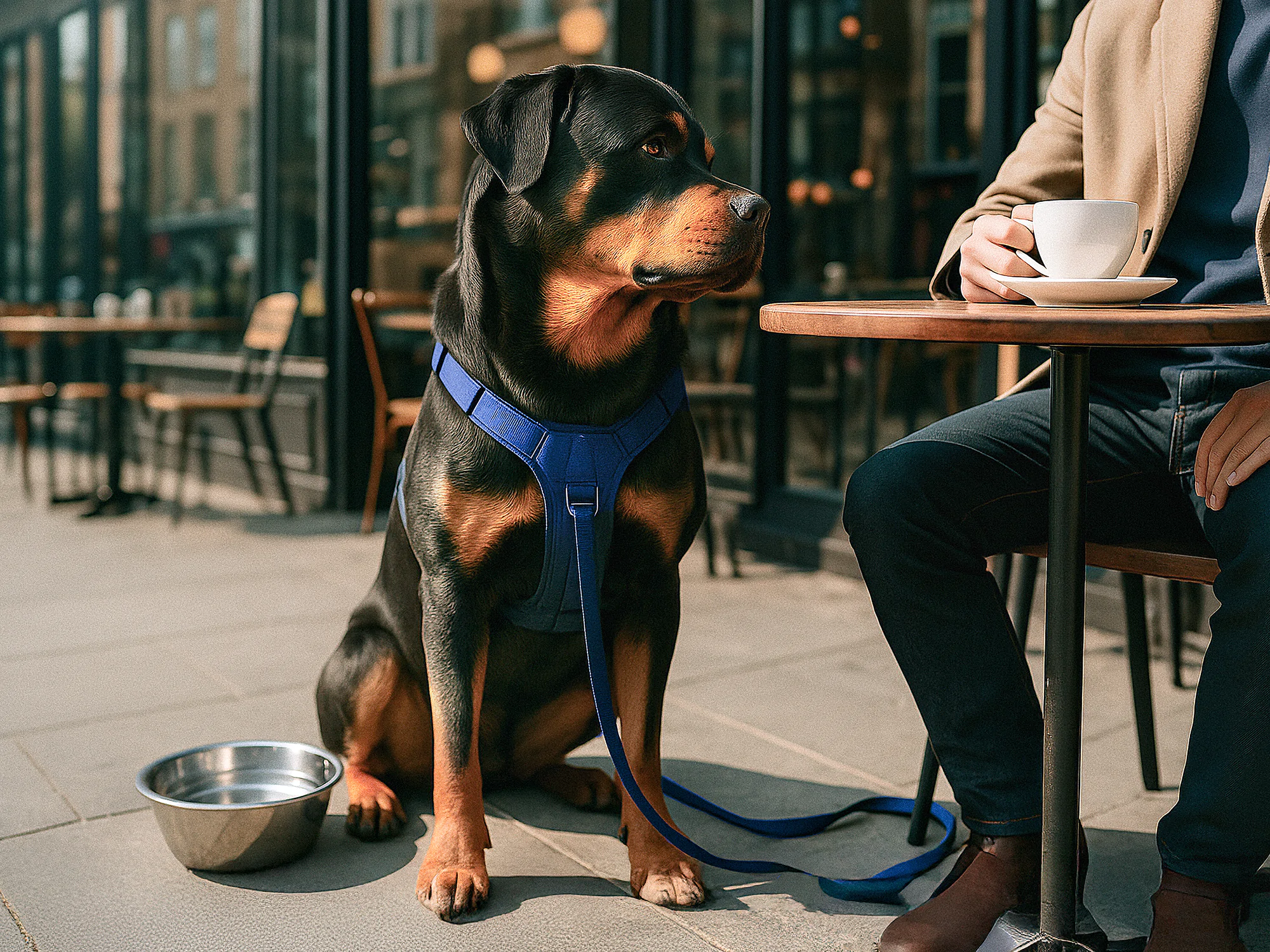

A guide to owning a Rottweiler
The Rottweiler is a strong, intelligent and loyal breed bred as a working dog and guard dog. As a bit of a tank, Rottweilers need knowledgeable, committed owners who can provide proper training, socialisation and care. Here we’ll take you through what you need to know, from grooming needs and common health concerns to temperament, exercise and training.
Are Rottweilers good family dogs?
With proper socialisation, Rottweilers are great family dogs. They’re very loyal, protective and affectionate with their family – including children. But it must be remembered that they are large, powerful dogs. This is why early socialisation is absolutely essential. Plus they may be a bit much for younger children, so they should always be supervised while together.
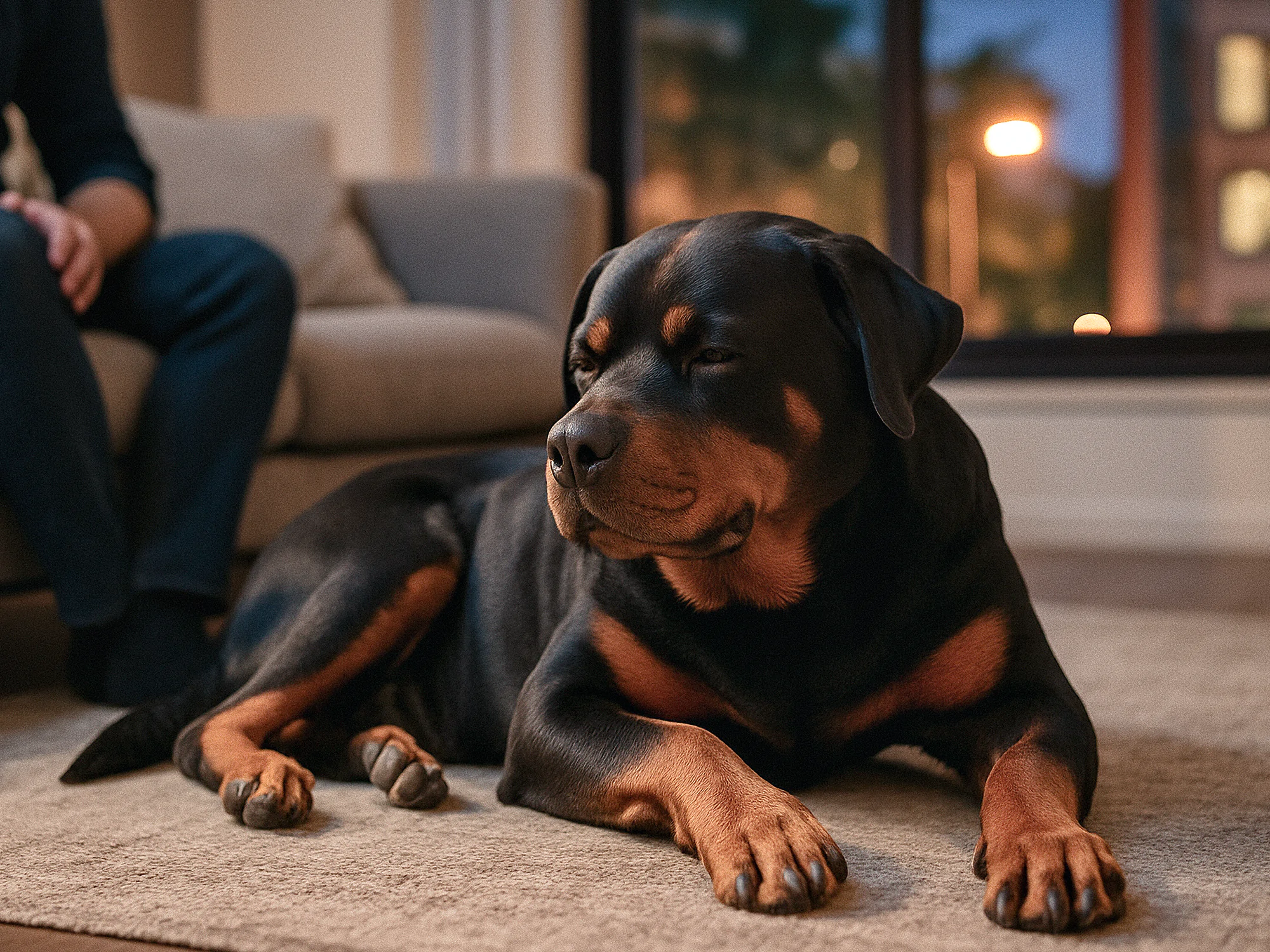

Rottweiler size and appearance
Rottweilers are instantly recognisable as a powerful, muscular dog with a striking appearance. They also have very distinctive colouring and patterns. Their short glossy coat is typically black, with tan, rust or mahogany markings on their face (including a spot over each eye), chest and legs.
Males are usually around 61-69cm tall at the shoulder, weighing between 50-60k. Females are slightly smaller, standing at about 56-63cm tall, weighing 35-48kg. They have a broad head, strong jaw and dark eyes. They’re self-assured looking dogs, with a calmness that indicates good humour.
What were Rottweilers bred for?
Originating from Germany, Rottweilers were historically used to herd livestock and pull carts. Today they’re better known as devoted companions and excellent guard dogs.
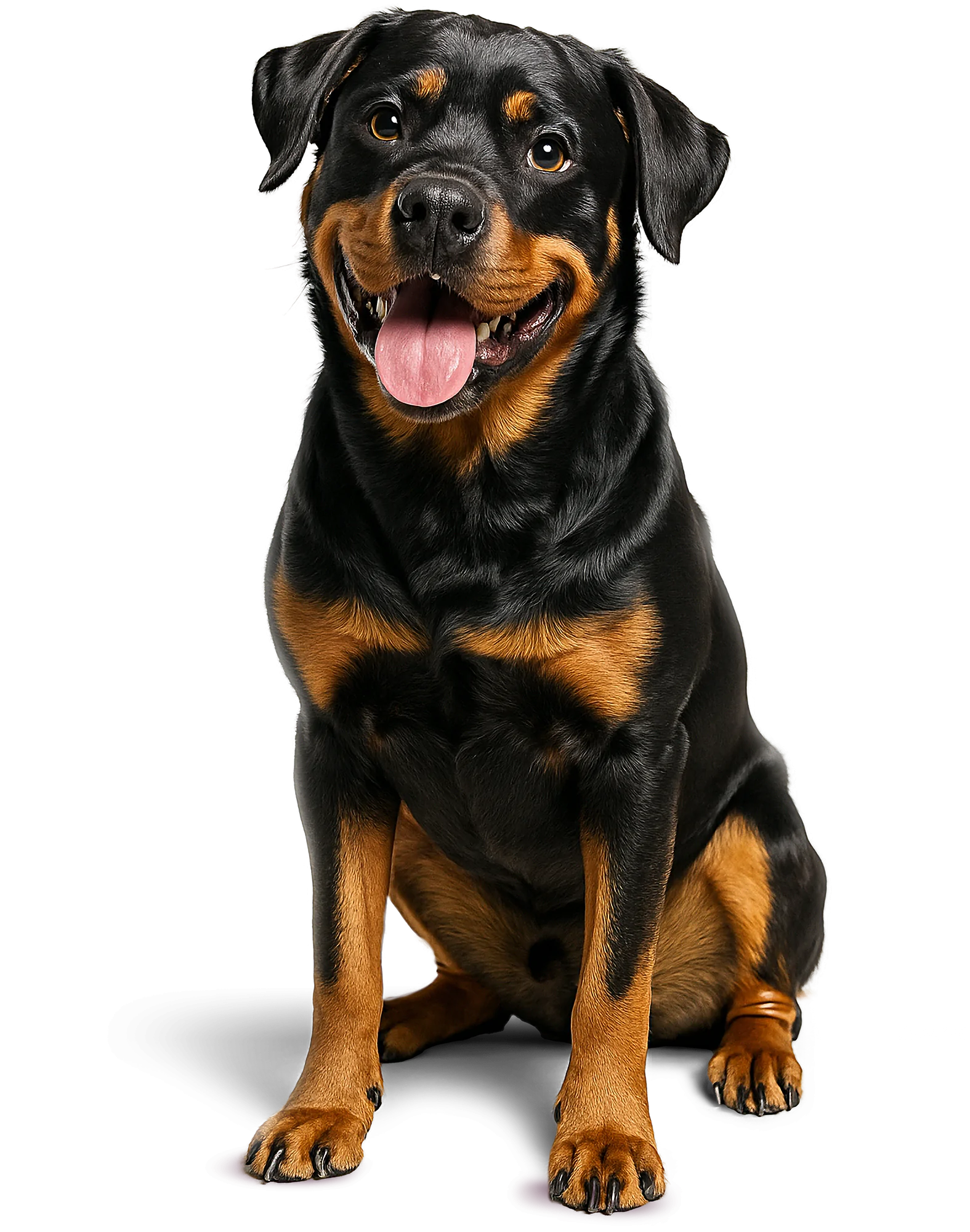

What is a Rottweiler’s temperament?
The Rottweiler’s personality is:
- Protective and loyal: Rottweilers are deeply devoted to their family and naturally guard their home.
- Confident: They’re bold and self-assured.
- Calm: Well-trained Rottweilers are typically composed and even-tempered.
- Affectionate with family: They’re loving and gentle with their trusted humans.
- Can be aloof with strangers: Without proper socialisation, they can be reserved around unfamiliar people.
Can Rottweilers be left alone?
Rottweilers are social and love being around their family, so might suffer from separation anxiety if left alone for too long. You should be able to train them to be left alone for a few hours. To do this, start with short spells alone, and gradually increase the time you’re away.
It’s worth noting that no dog should be left alone for more than four hours. If you do have to leave your Rottie alone for a period of time, make sure they have access to fresh water. Also leave them with some familiar comforts, such as their favourite toys and blanket.


How much exercise does a Rottweiler need?
The Rottweiler is a robust and energetic breed. As such they need regular exercise to stay physically and mentally fit.
It’s worth noting that many Rottweilers have existing joint disease, which can make walking difficult. You should avoid a long daily walk until they’re fully grown, at about 18 months to two years. While they’re still developing, exercise needs to be regular enough to keep them fit and stop boredom, but also managed against their slow growth.
When they’re fully grown, you should be able to take them for a nice long walk, which could be as long as two hours.
Rottweilers are also very smart, needing plenty of mental stimulation, so factor this into play and training sessions. Without sufficient activity, Rottweilers can become bored and develop behavioural problems such as destructiveness or restlessness.
Can Rottweilers swim?
Rottweilers can generally swim, but how comfortable they are with the water is likely to depend on the individual. Some will take to it well, others may need more encouragement. Be sure to start slowly in shallow water, and make sure they’re closely supervised until they become more confident.
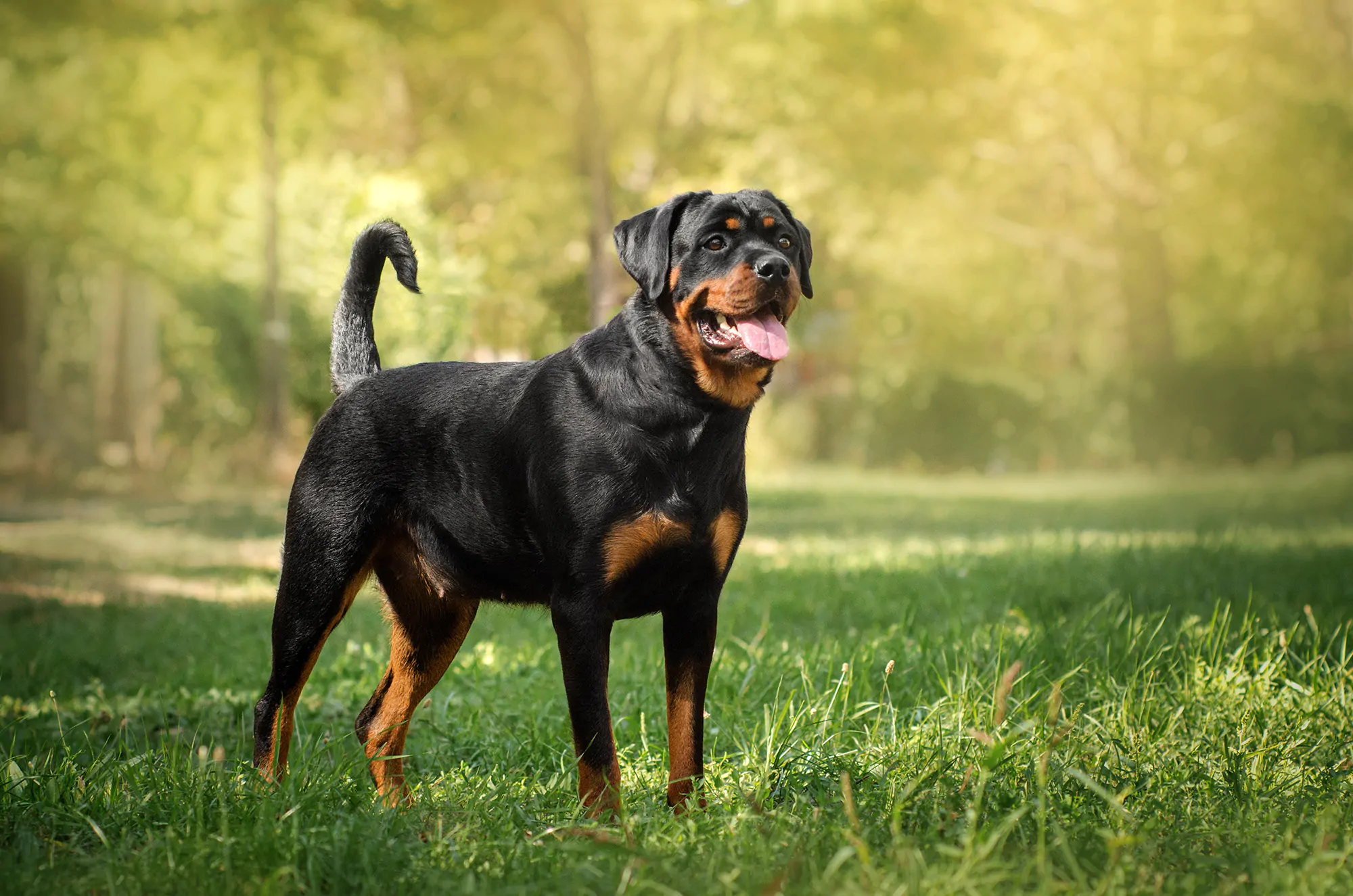

Our expert says…
“Rottweilers are a handsome giant breed, full of love and energy.
“As vets, we unfortunately see our ‘Rottie’ patients more often than others, as they’re prone to a number of conditions. One of these is cruciate ligament disease, where a ligament inside the knee stretches and/or snaps, requiring major surgery to try and minimise the pain and ongoing damage (with the other knee still likely to go the same way in the future!). The inevitable osteoarthritis this causes (as well as increased hip and elbow dysplasia in the breed) mean that rottweilers are very prone to obesity and all the issues associated with this.
“As a giant breed, care must be taken with feeding, to promote slow steady growth in the long term, but also to reduce the risk of gastric dilation volvulus (GDV or ‘bloat’) in the short term. This is a serious emergency condition where the stomach twists and blocks blood getting to the heart, and is often fatal.”
Dr Siân Burwood MA VetMB MRCVS


How long do Rottweilers live?
The average lifespan of a Rottweiler is around 8-10 years, which is typical for a giant breed.
What are the common health issues for a Rottweiler?
Rottweilers typically live between 8 to 10 years. And like many large breeds, they’re prone to certain health conditions. Common concerns include cruciate ligament disease, hip and elbow dysplasia and heart issues.
When getting a puppy, be sure to choose a reputable breeder who screens for genetic health problems. This will give you the best headstart regarding their health. And to reduce the risk of the issues mentioned, be sure to feed them a balanced large-breed diet, and give them plenty of exercise to help manage their weight.


Rottweiler grooming and hygiene
Rottweilers have a short, dense double coat that’s fairly easy to maintain. Regular grooming routines should include inspecting their paws and ears, plus dental care. Unless they get particularly dirty, you won’t need to bathe them regularly. Which is just as well, as it’s a big task!
Do Rottweilers shed?
They do shed moderately throughout the year, with heavier shedding in spring and autumn. A quick weekly brush will help remove loose hair and keep their coat healthy and shiny.
Are Rottweilers hypoallergenic?
No dogs are truly hypoallergenic, Rottweilers included. While their coat is short, they do shed all-year round, including dander (dead skin). People with mild allergies may be ok with them, but Rottweilers may trigger a reaction in those more sensitive to allergies.


How to train a Rottweiler
Let’s not beat about the bush – you should start training your Rottweiler puppy the moment you get them home. But as long as you’re clear, consistent and disciplined, it’ll be incredibly rewarding for both of you.
Here are a few pointers:
- Did we mention you should start early? Begin their training and socialisation from early puppyhood to shape good behaviour.
- Positive reinforcement is the way forward. They’re an intelligent breed, and respond well to rewards – whether that’s treats, praise or play.
- It’s also important to be firm and consistent. Rottweilers respect clear, confident leadership.
- Engage their minds too. Build advanced task and problem-solving activities into their training.
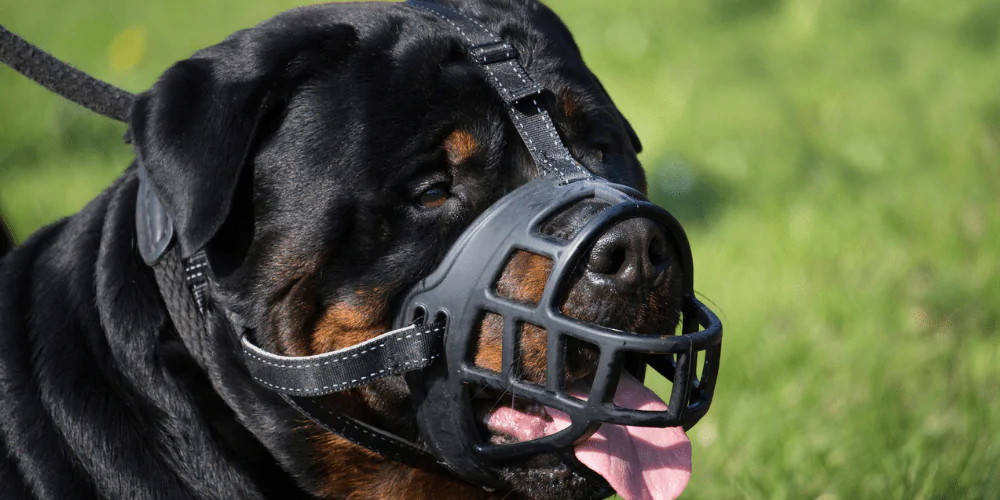

What insurance do I need for my Rottweiler?
Choosing a level of dog insurance your Rottweiler will usually depend on your circumstances and budget. So you know exactly what you’re getting for your money, read our guide to whether pet insurance is worth it.
We think that all dogs deserve the most comprehensive level of cover as possible, which is why we only sell different types of lifetime cover. We could also cover your Rottweiler for any pre-existing conditions they may have with our Lifetime Plus policy, subject to acceptance*.
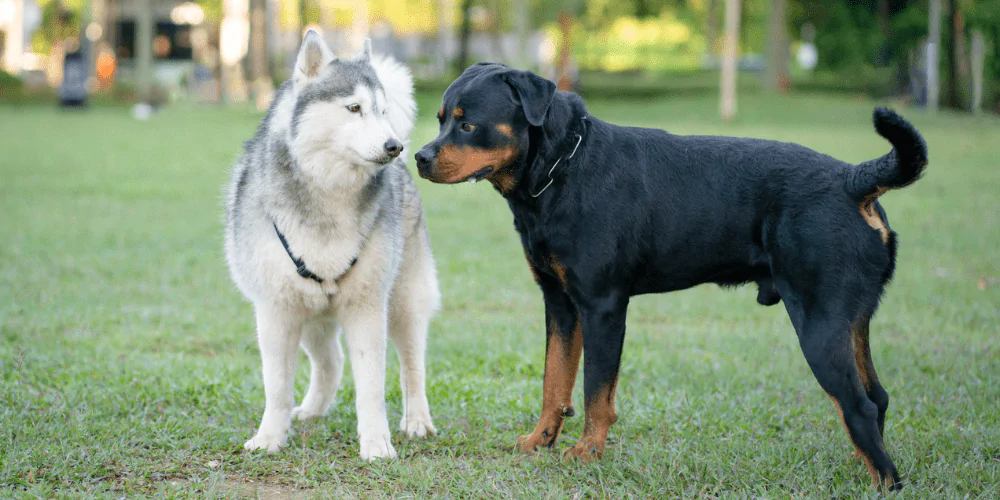

Guides and advice from experts
Our expert vets and behaviourists have great pointers to help keep your pet happy and healthy.

If your dog gets ill or has an accident, you want to give them the best care possible. Let’s take a look at why having pet insurance is important for your pooch.
What’s included in your dog cover
Choosing Petgevity to protect your dog gives you more than just vet fee cover. Here's what you get from our policy.
Dental accident
Covers your pet up to the chosen vet fee limit if they have a dental accident or injury. Always be sure to take your pet for annual dental check-ups, and follow your vet’s advice.
More info
Covers your pet up to the chosen vet fee limit if they have a dental accident or injury. Always be sure to take your pet for annual dental check-ups, and follow your vet’s advice.
Behavioural treatment
Get expert help with your pet’s mental and emotional wellbeing, as advised by your vet. Cover up to your chosen vet fee amount or the cost of up to 12 sessions, whichever is lower (Lifetime Plus); or up to £1,000 (Lifetime).
More info
Get expert help with your pet’s mental and emotional wellbeing, as advised by your vet. Cover up to your chosen vet fee amount or the cost of up to 12 sessions, whichever is lower (Lifetime Plus); or up to £1,000 (Lifetime).
Complementary therapy
As advised by your vet, this covers alternative treatments like acupuncture or hydrotherapy. Cover up to your chosen vet fee amount (Lifetime Plus); or up to chosen vet fee amount or £1,500, whichever is lower (Lifetime).
More info
As advised by your vet, this covers alternative treatments like acupuncture or hydrotherapy. Cover up to your chosen vet fee amount (Lifetime Plus); or up to chosen vet fee amount or £1,500, whichever is lower (Lifetime).
Emergency care
If you can’t look after your pet due to an emergency, such as an unplanned hospital visit, this covers you for up to £1,500 (Lifetime Plus) in minding costs.
More info
If you can’t look after your pet due to an emergency, such as an unplanned hospital visit, this covers you for up to £1,500 (Lifetime Plus) in minding costs.
Third-party liability for dogs
Covers you for legal costs if your dog causes injury to somebody or their pet, or causes loss or damage to someone’s property. Protects you for up to £2 million in a legal action.
More info
Covers you for legal costs if your dog causes injury to somebody or their pet, or causes loss or damage to someone’s property. Protects you for up to £2 million in a legal action.
Choice of optional extras
Need extra protection? Choose from several optional extras to cover your pet’s needs, including dental illness, or cover if your pet is stolen or lost.
More info
Need extra protection? Choose from several optional extras to cover your pet’s needs, including dental illness, or cover if your pet is stolen or lost.
Dental accident
More infoBehavioural treatment
More infoGet expert help with your pet’s mental and emotional wellbeing, as advised by your vet. Cover up to your chosen vet fee amount or the cost of up to 12 sessions, whichever is lower (Lifetime Plus); or up to £1,000 (Lifetime).
Complementary therapy
More infoAs advised by your vet, this covers alternative treatments like acupuncture or hydrotherapy. Cover up to your chosen vet fee amount (Lifetime Plus); or up to chosen vet fee amount or £1,500, whichever is lower (Lifetime).
Emergency care
More infoIf you can’t look after your pet due to an emergency, such as an unplanned hospital visit, this covers you for up to £1,500 (Lifetime Plus) in minding costs.
Third-party liability for dogs
More infoCovers you for legal costs if your dog causes injury to somebody or their pet, or causes loss or damage to someone’s property. Protects you for up to £2 million in a legal action.
Choice of optional extras
More infoNeed extra protection? Choose from several optional extras to cover your pet’s needs, including dental illness, or cover if your pet is stolen or lost.
*Cover for pre-existing medical conditions is subject to acceptance. They will not be covered unless you have declared them and they are shown on your Confirmation of Cover.
